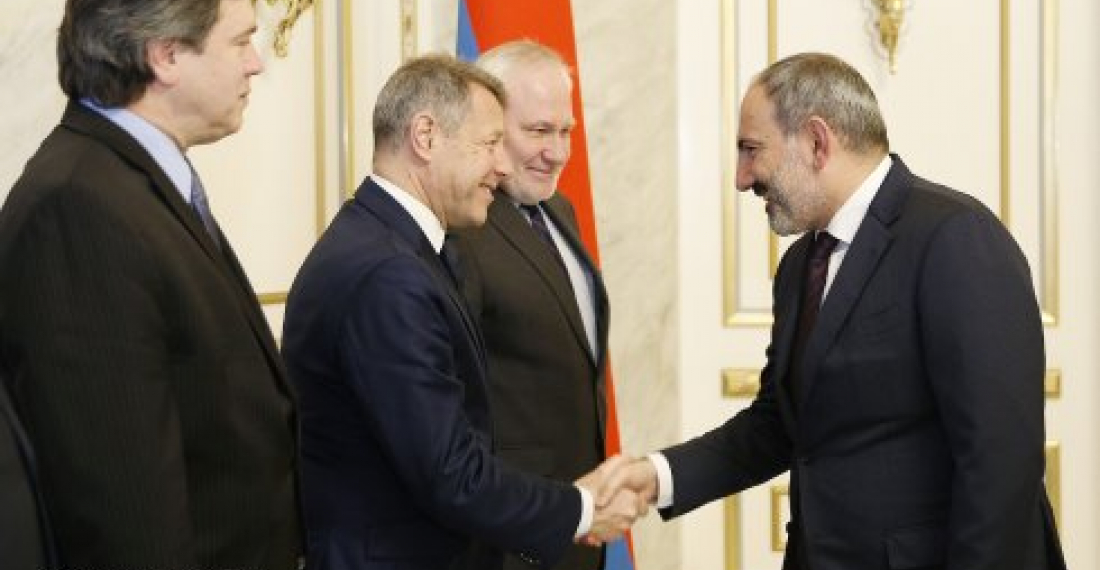Amid talk of the need to prepare public opinion for an eventual peace over Nagorno-Karabakh, in this op-ed for commonspace.eu, Richard Giragosian, the head of a leading think tank in Yerevan, questions recent statements by some Armenian politicians
Following a recent visit to the region, the three Co-Chairs of the OSCE Minsk Group, the sole diplomatic entity mediating the Nagorno Karabakh (Artsakh) conflict, issued a statement in Vienna on 1 March. The visit, which included meetings with the Armenian and Azerbaijan leaders, was in preparation for an upcoming diplomatic summit aimed at leveraging the accelerated pace of the Karabakh peace process in recent months. And the statement also noted that recent progress, with specific references to the "continuing lack of casualties on the line of contact" and the "developing discussions in the region about preparing populations for peace."
While the diplomatic tenacity and decline in tension each contributes to a more positive environment for mediation and, therefore, a clearly welcome development, there are some new concerns. More specifically, despite the optimism inherent in the statement, neither the absence of clashes nor the pledges to "prepare for peace" are sufficiently sincere or as significant as they seem.
For example, the ceasefire agreement over the "line of contact" remains seriously tenuous and has actually never regained any degree of security or stability since its sudden demise during the outbreak of serious fighting in April 2016. Moreover, the decline in casualties from ceasefire violations is also a rather weak indicator of any lasting decrease in the risk of renewed hostilities.
Rather, the lack of any such incidents along the Karabakh frontline is as much due to seasonal considerations, whereby the previous record of casualties from ceasefire violations has traditionally been less in the winter months, as a sign of political prudence and restraint. At the same time, with the onset of Spring, it would not take much to trigger or to tempt a sudden round of fresh casualties, especially given the greater risk from military considerations of force posture and the proximity of forces.
Beyond the over-estimation of the significance of the "lack of casualties," the mediator's rather misplaced optimism from the important, yet still improbable commitment by all sides to "prepare populations for peace," also reflects a case of wishful thinking. Such skepticism over the sincerity of promises to prepare for peace differs from past doubts, however, as this time it is Armenia that is responsible for undermining confidence.
Recognizing the Armenian role in questioning the likelihood for such public preparation stems from recent statements by Armenian officials that not only challenged the necessity for compromise and concession but clarified a more assertive stance over territorial bargaining. The statements, for example, included an outright repudiation of any expectation of "lands-for-peace formula" by Armenian Prime Minister Nikol Pashinyan. This was reiterated by the head of Armenia's National Security Service (NSS), Artur Vanetsian, who went much further by vowing to "send a clear message to the Armenian people and the outside world to the effect that we do not intend to give back a single inch of land."
Such statements not only infer a change of course in the discourse over the Karabakh (Artsakh) conflict, but also reveal that the necessity to "prepare the public for peace" must now include an effort to "prepare the politicians for peace" as well.
This is further significant for the questions such statements raise, including the suggestions of a serious shift in Armenia's diplomatic strategy over Karabakh (Artsakh). Most notably, if such a policy shift is in fact underway, what will be Armenia's diplomatic tools or assets? If any territorial concession is no longer the basis for negotiated resolution in return for Artsakh, what is the gain from giving up the core bargaining chip?
Based on these questions, and assessing the implications from these statements, there is a deeper and unprecedented question over the future strength of Armenia's official approach to the Artsakh peace talks. And after years of an Armenian reliance on "creative ambiguity" as an effective negotiating tactic, such a policy shift may not only stem from insecurity and inexperience but may also lead to significant setbacks in Armenia's diplomatic position and prestige within the peace process.
related content:
Avaz Hassanov on why preparing societies for peace in Karabakh is not so simple
New report outlines how confidence building measures can contribute to Karabakh conflict settlement
Source: Richard Giragosian is the director of the Regional Studies Center (RSC), an independent "think tank" in Yerevan, Armenia. (director@regional-studies.org)
photo: Armenian prime minister Nikol Pashinyan, welcoming th co-chairmen of the OSCE Minsk process during their recent visit to Yerevan (picture courtesy of the press service of the government of Armenia)
The views expressed in opinion pieces and commentaries do not necessarily reflect the position of commonspace.eu or its partners







